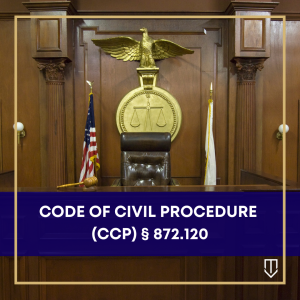Code of Civil Procedure (CCP) Section 872.130–Partition Law Injunctions

California Code of Civil Procedure section 872.130 expands the court’s authority in an effort to make the court system more efficient when ordering a property to be partitioned. The section allows the court to issue temporary restraining orders and injunctions without the hurdles of contempt or general provisions to make such orders. Code of Civil Procedure section 872.130 states In the conduct of the action, the court may issue temporary restraining orders and injunctions, with or without bond, for the purpose of: (a) Preventing waste. (b) Protecting the property or title thereto. (c) Restraining unlawful interference with a partition of the property ordered by the court. (Amended by Stats. 1976, c. 73, p. 110, § 6.)
What is an example?
For example, “Steve” and “Natasha” were an engaged couple who decided to buy a house together. The couple had agreed to split the cost of the down payment and then alternate paying the mortgage payments. Each was entitled to an undivided one-half interest in the house. After a year of living together, however, Steve and Natasha realized that they were not meant for each other and called off the engagement. Steve wanted to sell the home, but Natasha wanted to keep the home and rent it out, so they could make a profit. The two refused to agree on how to move forward, so Steve, through a lawyer, filed an action for partition. Ultimately, the trial court entered an interlocutory judgment and ordered a partition of the property by sale. However, Natasha, still upset over her failed engagement and loss of the partition suit, went to the property and bashed all the windows with a bat, and destroyed the furniture in the home. As a result, Steve asked the court for a temporary restraining order directing Natasha not to enter the property or cause any further damage. The court granted the temporary restraining order and ordered the allocation of the costs of partition. The court subsequently ordered a preliminary injunction ordering the same. Natasha appealed, arguing that the trial court erred in awarding fees and costs to Steve related to injunctive relief because those proceedings were an independent cause of action and an injunction against Natasha for waste. Contrary to Natasha’s claim, however, the injunction proceedings were a crucial part of the partition proceeding itself, as it was aimed at protecting the value of the property against Natasha’s actions. Through section 872.130, the court had express power to order a preliminary injunction to protect the property. Therefore, the trial court’s order was upheld. Afterward, Steve worked on fixing the damage that had been made to the property, and the house was able to be sold.
Law Revision Commission Comments (CCP § 872.130)
1976 Addition Section 872.130 is new. It gives the court authority to take the protective steps described without having to rely either upon its contempt powers or the general provisions as to temporary restraining orders and injunctions.
Assembly Committee Comments
Section 872.130 was added by Assembly Bill 1671 in 1976. The bill was meant to reorganize, revise, and modernize century-old statutes on partitioning real and personal property. The bill revitalized partition law and included provisions such as: extending the type of property ownerships that were partitionable to include successive estates of inheritance for life or for years, where a partition is in the best interests of the parties, and expanding existing law to provide a detailed procedure for sales. The bill was sponsored by the Law Revision Commission. The Commission’s consultant for the partition study was Mr. Garrett Elmore, a practicing attorney who had experience as a partition referee and who, for many years, was counsel to the State Bar Committee on the Administration of Justice. In its comments, the committee emphasized that the statutes for partition had been unchanged since 1872 and therefore needed some serious revisions. In their previous state, the statutes contained a great deal of obsolete material, and there were gaps and ambiguities in the procedural detail of the existing law. These defects contributed to the decline of partition as a useful remedy. The existing law was unduly lengthy or dealt with several subjects. Their order was often haphazard. There were a few duplicate matters that were handled more adequately by general provisions of law governing civil actions. Nearly all of it contained archaic or obscure language. Therefore, Assembly Bill 1671 was introduced. Amongst several other things, the bill codified the broad authority of the court to hear motions, make orders and decrees, and issue temporary restraining orders and injunctions relative to partition actions. While not originally in the drafted bill, the assembly amended the bill to include this broad authority because the court apparently already had such authority, but the bill would codify it. Once the bill was adopted, it would implement statutes such as what is now known as California Code of Civil Procedure § 872.130.








